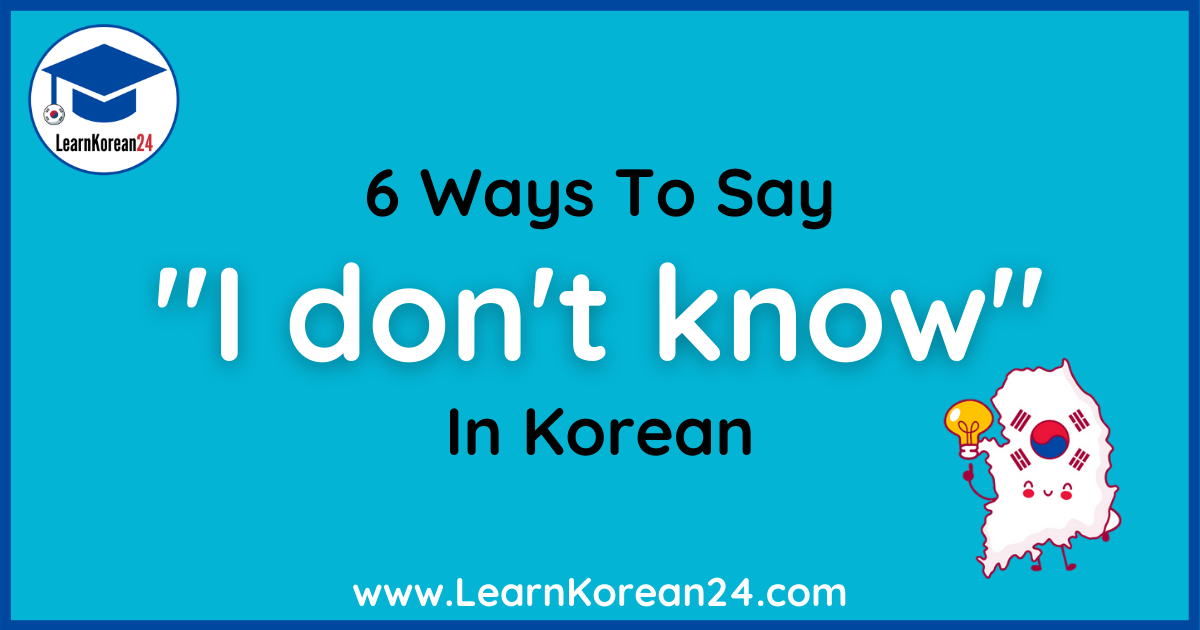6 Ways To Say ‘I Don’t Know’ In Korean
When speaking in Korean, there will inevitably be times when you don’t know something and want to say “I don’t know” in Korean. Learning how to say “I don’t know” can be incredibly useful for Korean learners. In this lesson, you will learn 6 different ways how to say ‘I don’t know’ in Korean including the casual, polite, and formal ways to say ‘I don’t know’ in Korean.
Related: I know In Korean
How To Say ‘I Don’t Know’ In Korean
1. 몰라 [mol-la] (Casual)
The casual/informal way to say ‘I don’t know’ in Korean is 몰라 [mol-la]. 몰라 comes from the verb 모르다 which means ‘to not know’. When conjugated in the present tense 모르다 becomes 몰라. As 몰라 [mol-la] is the casual/informal way to say ‘I don’t know’ in Korean, it can only be used with close friends or those much younger than you. In most situations, it is best to use the polite or formal forms.
2. 몰라요 [mol-la-yo] (Polite)
The polite way to say ‘I don’t know’ in Korean is 몰라요 [mol-la-yo]. As you can see, this way to say ‘I don’t know’ is the same as the casual form with 요 added. Adding 요 makes the expression polite, and so this can be used in most situations.
3. 모릅니다 [mo-reum-ni-da] (Formal)
The formal way to say ‘I don’t know’ in Korean is 모릅니다 [mo-reum-ni-da]. 모릅니다 is the verb 모르다 (to not know) plus the formal ending ~(스)ㅂ니다. As 모릅니다 is the formal way to say ‘I don’t know’ in Korean, this expression can be used in formal situations and times when you want to sound extra polite and respectful.
4. 모르겠어요 [mo-reu-gae-sseo-yo] (Polite)
모르겠어요 [mo-reu-gae-sseo-yo] is another common way to say ‘I don’t know’ in Korean that you will hear a lot. 모르겠어요 is the verb 모르다 (to not know) plus the ending 겠, which in this context is similar to the word ‘guess’. So, 모르겠어요 means ‘I guess I don’t know’ or ‘I think I don’t know’. Compared to 몰라요, 모르겠어요 sounds a little softer.
5. 잘 모르겠어요 [jal mo-reu-gae-sseo-yo] (Polite)
You can make 모르겠어요 sound even more softer by adding 잘 (well) to make the expression 잘 모르겠어요 [jal mo-reu-gae-sseo-yo]. 잘 모르겠어요 means ‘I guess I don’t know well.’
6. 모르겠습니다 [mo-reu-gae-ssum-ni-da] (Formal)
This last way to say ‘I don’t know’ in Korean is another formal expression. 모르겠습니다 [mo-reu-gae-ssum-ni-da] is the verb 모르다 (to not know) plus 겠 (guess), plus the formal ending ~(스)ㅂ니다. Compared to the other formal way to say ‘I don’t know’ (모릅니다), 모르겠습니다 sounds a little softer as you are saying ‘I guess I don’t know’ with the formal ending attached. As with 모르겠어요, you can also make this expression even softer by adding 잘 to 모르겠습니다 to make 잘 모르겠습니다 (I guess I don’t know well.’.
Are you ready to get serious about learning Korean? Start our 100% FREE online Korean language course today!

